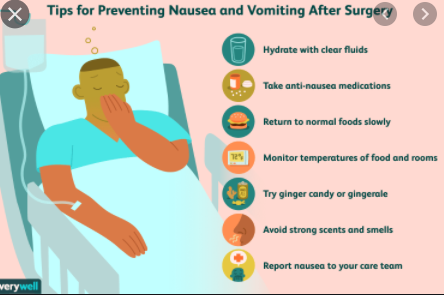Nausea and vomiting are can be experienced by patients with liver disease and may have many causes. Nausea and vomiting are important symptoms to look after as they can lead to constipation, dehydration and weight loss. Talk to your healthcare provider if you are experiencing nausea and vomiting that is affecting your day to day life. They may be able to treat the cause of your nausea and vomiting and can provide advice about what to eat to obtain the nutrients your body needs. You may also be referred to a dietitian.
What is nausea?
Nausea is the feeling you get when you think you might throw up. The urge to vomit does not always result in vomiting. Nausea is often described as feeling ‘queasy’ or ‘sick to your stomach.’
What is vomiting?
Vomiting is when you actually throw up, emptying stomach contents through your mouth. Muscles along the wall of your abdomen contract and create movement to bring the contents up.
Risk of Dehydration
A concern with vomiting is the risk of dehydration. Common symptoms of dehydration include:
- increased thirst
- dry mouth
- dry lips
- decreased urination
What causes nausea and vomiting?
There can be many causes of nausea and vomiting if you have cirrhosis:
- constipation
- swelling in your abdomen (ascites)
- Medications
- Alcohol and illicit substances
- infection
Treatment
Typically, at home methods can treat mild nausea caused by liver disease or the side effects of liver disease treatment. If you are struggling with nausea and vomiting, your doctor may be able to prescribe medicines to prevent and treat nausea and vomiting. Be sure to tell your doctor if you continue to have problems after your treatment.
What can I do?
Nausea remedies
You may want to try the following at home treatment tips for nausea. Be sure to consult with your doctor if you are experiencing different or worsening nausea.Maintain good oral hygiene
- Make sure you drink enough liquids so you don’t get dehydrated. Take a few sips at a time
- Make sure you are still eating enough good. Try frequent small meals instead of bigger meals
- Try ginger, such as ginger tea or ginger candy. Real ginger helps to reduce nausea.
- Avoid greasy, spicy or excessively sweet foods
- Stay upright for about 1 hour after eating, as this can help with digestion
- Do not drink alcohol
Vomiting remedies
You may want to try the following at home treatment tips for vomiting. Be sure to consult with your doctor if you are experiencing different or worsening vomiting.
- Get some rest
- Try a drink with electrolytes to restores lost fluids and nutrients
- Gradually drink more clear liquids
- Avoid solid foods until symptoms pass
- Eat smaller amounts of food more frequently and adjust timing of meals as necessary. Eat slowly.
- Do not drink alcohol
Prevent Constipation
- Take all of your medications (including Lactulose) as prescribed
- Eat regular meals and snacks through the day to keep food moving through the bowel
- Drink enough fluid
- Be as active as possible to help your bowels move
Symptoms to watch for
The symptoms of nausea and vomiting are typical across different diseases and conditions. Be on the watch for these additional symptoms if you are experiencing nausea and/or vomiting and you have cirrhosis:
- you have signs of dehydration
- vomiting has lasted longer than 24 hours
- you have changes in mental alertness (personality change, fatigue, confusion, irritability)
- you vomit blood or your vomit looks like coffee grounds
- you develop belly pain
Vomiting Blood
Throwing up blood is a medical emergency. With cirrhosis, a scarred liver has to work hard to filter your blood. The blood that flows from the veins in the esophagus have a hard time moving through the damaged liver. As a result, these veins begin to enlarge. When these blood vessels rupture, throwing up blood occurs. You can lose significant amounts of blood within a short period of time and it is important that you get proper treatment. In addition to vomiting blood other symptoms can be found here: Esophageal Varices


